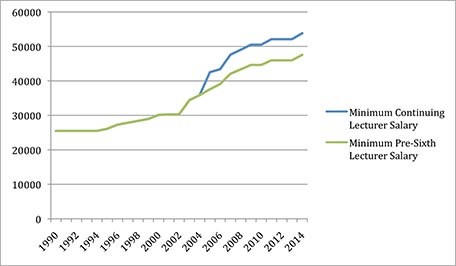Unions Get a Temporary Reprieve from Losing Fair Share
Currently, UC-AFT, and other public unions, collects dues from all members regardless of whether they decide to join the union or not. The logic behind this comes in part from a Supreme Court Case called Abood. The Court ruled that since public unions have to negotiate for and protect all of their members, then they can compel everyone to pay their fair share. One reason for this ruling is to protect against “free riders,” who are people who are protected by the union but choose not to pay any dues.
In Harris v Quinn, the decision made on June 30th 2014, the majority ruled that in the case of personal home care workers in Illinois, who are hired and fired by the people they serve, the union could not compel them to pay fair share dues. This is a narrow ruling, but it sets up another future case. The bottom line right now for UC-AFT is that nothing will change, but we could lose fair share in the future.
In her dissenting opinion, Elena Kagan takes on the conservative majority and offers a blistering critique: “Perhaps…the majority’s skepticism about Abood comes from a different source: its failure to fully grasp the government’s interest in bargaining with an adequately funded exclusive bargaining representative. In other words, the conservative majority is setting up a reversal of fair share based on the idea that many different type of organizations represent all of their members, but they do not compel them to pay dues.
Kagan responds to this absurd claim in the following: “The law compels unions to represent—and represent fairly—every worker in a bargaining unit, regardless whether they join or contribute to the union. That creates a collective action problem of far greater magnitude than in the typical interest group, because the union cannot give any special advantages to its own backers. In such a circumstance, not just those who oppose but those who favor a union have an economic incentive to withhold dues; only altruism or loyalty—as against financial self-interest—can explain their support. Hence arises the legal rule countenancing fair-share agreements: It ensures that a union will receive adequate funding, notwithstanding its legally imposed disability—and so that a government wishing to bargain with an exclusive representative will have a viable counterpart.” Here the need for a union to collect dues from all of its members is upheld based on the problem of free riding. Since, we as a union have to represent everyone, everyone has to pay.
Kagan adds that the majority’s decision is without merit:
“The majority gets it wrong: Illinois has a more than sufficient interest, in managing its workforce and administering the Rehabilitation Program, to require employees to pay a fair share of a union’s costs of collective bargaining.”
This dissenting opinion concludes with the following defense of fair share: “All across the country and continuing to the present day, citizens have engaged in passionate argument about the issue and have made disparate policy choices. The petitioners in this case asked this Court to end that discussion for the entire public sector, by overruling Abood and thus imposing a right-to-work [for less] regime for all government employees.”
The good news out of this case is clear: The majority declined that radical request. Unless the makeup of the court changes, we should expect the bad news to triumph in a future case; in other words, the majority is primed to rule against fair share. UC-AFT must do everything it can to sign up all of the people we represent so that we are not vulnerable when a new ruling comes.
The ruling can be read at: http://www.supremecourt.gov/opinions/13pdf/11-681_j426.pdf
What UCAFT has done for our members since fair share was enacted in the year 2000 can be read at:
https://ucaft.org/sites/default/files/main/UC-AFT_Accomp_2014_1.pdf
https://ucaft.org/sites/default/files/main/UCAFT_Diff_Chart_Flyer.pdf
To join UCAFT, and support your bargaining team for the upcoming Non-Senate Faculty contract negotiations, go to:
https://ucaft.org/sites/default/files/main/UC-AFT%20Membership%20form%20...
and send the form back to:
Secretary/Treasurer, Miki Goral
11728 Wilshire Blvd. #B1007
Los Angeles Ca 90025
Finally, a comparison between pro-Union states and “right to work for less” states:
http://www.aflcio.org/Legislation-and-Politics/State-Legislative-Battles...

- Log in to post comments

